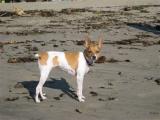Posted under U.S.
Now that we’re back and we have had a chance to reflect on our journey, we have written a follow-up post to the Interview questions that we published in April.
What were your top five destinations and why?
Tina:
India, particularly Rajasthan: India has an amazingly colorful culture. Every person on the streets could be a National Geographic cover. In Rajasthan, the desert is golden, the buildings are stucco or clay, but the people love color so they wrap themselves in vibrant hues – even the men wear bright red or fuschia turbans – and adorn their homes with flowers and colorful tiles. The food is sensational. The people are friendly. The architecture, history, religious dynamic and volatility are fascinating. India is the dirtiest place I have ever experienced but I am utterly enthralled by it.
Japan: It wasn’t even on our initial list of places that we wanted to visit. We only went because we had friends from the States who were living there at the time and we wanted to visit them. From the day of our arrival to the day we left, two weeks later, I was bowled over by Japan. The gardens and architecture were especially impressive. I never tired of wandering through public parks and private gardens with their enchanting pagodas and twisted trees. Everything was pristinely manicured and seemed somehow perfectly placed to inspire an overall feeling of peace and well-being. Japan was full of unique and fascinating experiences: visiting the Atomic Bomb Museum in Hiroshima, dressing up as a geisha in Kyoto, feeding deer in Nara, dining on Kobe beef in Kobe, our beautiful stay at the ryokan in Tsumago/Magome, visiting the Jensens in Tokyo, and, of course, the cherry blossoms. Japan was one of the places in which we struggled most with the language barrier but every experience was dazzling and unforgettable. It was one of the true gems of our trip.
New Zealand: What’s not to love? New Zealand is one of the most beautiful places on Earth! For outdoor lovers like us, there are so many things to see and do. Queenstown was one of the coolest cities on our itinerary with stunning scenery and a ski town vibe. We spent the majority of our time on the South Island, reveling in some of the most breathtaking places imaginable. We sampled the delights of the Marlborough wine region and embarked on a host of outdoor activities like hiking the Routeburn Track, kayaking in Abel Tasman National Park, boating on Milford Sound. The North Island, though slightly less aesthetically pleasing than the South, was still spectacular. Our day of sailing in the Bay of Islands was one of our best days on the road and, if we ever do another trip around the world, it will be on a sailboat, inspired by that day. New Zealand is easy travel for Americans because everyone speaks English and the culture is similar yet uniquely interesting. It is a long way to get there but most definitely worth the trip.
France and Italy: It seems like a cliché to put France or Italy on this list but it must be done. The two are simply dazzling. No matter how much they have been built up in your mind before you go, you are still floored by the beauty of their art and architecture and by their cuisine and outdoor café culture. I had a wonderful Humanities class at U of A that exposed me to the world of European art. I have since been fascinated by it so the churches and museums in France and Italy were among the most significant sights on my wish list. The Louvre and the Vatican greatly exceeded my highest expectations and I would return a hundred times over, just to spend more time there. The Italian coastal towns of Amalfi, Positano, Atrani and Cinque Terre are among the most beautiful places in the world. Also, the wine regions of Bordeaux, St. Emilion and Tuscany were absolutely breathtaking. Bordeaux came with a little too much French attitude but I did love every wine that we tasted and there is a magic about St. Emilion that you must experience to fully understand. We also loved finding spectacular local wines in both France and Italy for 2-3 Euros a bottle.
Runners Up: Bali, Belgium, Zanzibar, South Africa, Australia, Thailand…not necessarily in that order.
Aaron:
1. India – It was one of the most interesting and colorful places that I’ve ever seen.
2. Russia – Beautiful churches and warm, friendly people. This was the most difficult place for us to travel, from visas to language barriers, and it remains one of the most mysterious countries on earth, but I loved it.
3. Japan – There is so much history and culture here that contrasts with the first world, consumer-driven society.
4. France – World-famous museums, wines, and cheeses…and a patisserie on every street!
5. New Zealand, South Island – One of the most physically beautiful places on earth.
What was your least favorite destination and why?
Tina:
I enjoyed every place that we visited. There were a few, however, that I enjoyed less due to my own circumstances. The countries on their own merits were fine otherwise:
Mozambique: the diving was disappointing and the accommodation was pretty awful but the beaches were beautiful and the people were kind. Our greatest difficulties in Mozambique were our hyper-sensitivity to the sun – a side effect of our malaria pills; rain leaking through the roof of our hut onto our bed; cold water showers; and rats that ran through our hut each night.
China: I had a serious mental block about China and I don’t know why – the sights and accommodation were excellent. The language barrier was at times exhausting. The public smoking was atrocious. And there were SO MANY PEOPLE!!! In China, I felt like I was almost constantly in a crowded elevator, inhaling other people’s breath and secondhand smoke.
Lamu (an island off the coast of Kenya): What was intended as a “vacation from our vacation” turned out to be a real disaster in almost every way: awful accommodation; food poisoning and mosquitoes for Aaron; no services on the beach; and our misadventure with the Now Legendary Captain Barracuda. The saving grace was that we got to hang out with our friend Marie again. The fresh mango juice was absolutely divine but Aaron would NOT recommend the fish!
Aaron:
Nepal. We were there in the middle of the off season and there wasn’t much to do. We couldn’t see the world famous mountains because the visibility wasn’t good and it was too hot and humid to explore much outside of the cities. Added to that, we were simply waiting to find out if Tina’s medical condition would improve. It probably had more to do with our mental attitudes at the time than the place itself, but it seemed like the longest three weeks of my life.
Describe the most physically difficult experience?
Tina:
The first day of the mountain trek in Chiang Mai in northern Thailand – the longest and steepest uphill climb of my life! It hurts just thinking about it.
Aaron:
We arrived at the train station in Suzhou, China in the middle of a rainstorm. We overpaid a gypsy taxi that dropped us off in the wrong part of town. Then we trudged around with our bags in the pouring rain. After several attempts we finally flagged down a rickshaw driver who would take us to the right hostel, we rode in the mostly uncovered backseat for another twenty minutes getting completely soaked. When we finally arrived at the hostel, the driver tried to extort us for more money – and Tina nearly killed the guy. We were cold, wet and both in a bad mood. It was miserable.
Name one thing that you’ve learned about yourself.
Tina:
I love my country! I am so much more patriotic than ever before. We live in the best country on Earth and there is nowhere else I’d rather be in the long term; no other citizenship I would rather have. Strangely, I thought that the trip would have the opposite effect on me because Europe is so glamorized by Americans and you always hear about how Americans are perceived negatively abroad. In many countries, we are perceived negatively. However, if you gave most of those same people the opportunity to come and live here, they would be on the boat faster than you could say “United States of America”.
Aaron:
While I’ve discovered how to be a little more patient and less antsy, I still can’t sit still for long. And I still get annoyed when I have to wait…and I’m not good at hiding my impatience.
What did you miss most about home?
Tina:
My dog, my bathroom, and salad.
Aaron:
Lena, our little furry child substitute. No matter how long we were away, we thought about her at least once a day and often much more than that. It didn’t really feel like we were home until we had spent about a week with our little dog and she knew that we were here to stay.
The ability to get any consumable that I want at anytime. There were a number of times during our travels when we had tremendous difficulty finding simple everyday items like deodorant and toothpaste. I’ll never take Walmart for granted again!
What was one of your favorite activities?
Tina:
Swimming with dolphins off the coast of Zanzibar
Aaron:
Watching the Tour de France! We woke up early and waited for hours along the Champs Elysees for the final stage of the Tour. When the riders finally came around for their first of eight laps, it was totally worth it. After sitting and standing on the concrete curb for nearly eight hours, we stood for another hour on our aching feet to watch all eight laps. My mom and Tina were both there and were so patient – I’ll never forget that day!
What did you enjoy most about life on the road?
Tina:
The simplicity of living out of a backpack. There is something organic and reassuring in the realization that all the material possessions you really need can be carried on your back. It is quite a shocking experience to live like that for over a year and then come home to examples of American excesses around every corner…your own storage space included. Aaron’s jaw dropped when he found a crate of his sweaters…just sweaters – a whole box of them! It is amazing to think about how much more we have than we really need and funny/sad that we always seem to be trying to get more and more and more. Unfortunately, these things often distract from what is truly important.
Aaron:
The simplicity of living out of a backpack. Everything you own is on your back. If you buy something, you have to carry it. It really made me analyze every purchase decision. And there was rarely any indecision about what clothes I would wear on a given day – whichever shirt or pair of pants was cleanest.
What did you enjoy least about life on the road?
Tina:
The bathroom situation. I’ve been candid in my blog posts about my “germophobic” tendencies and our varied and often shocking bathroom experiences around the world. For some people, where and how they attend to this necessary human function is not a big part of their day. Well, for me, it is a HUGE part! In fact, some of our days seemed to actually revolve around it. Every country was a little different and it was ALWAYS more difficult for women. For example, I remember a day in Rishikesh, India when we were out walking around town. I had to go and there was literally nowhere that I could go. India is a place where men pee anywhere and everywhere, like dogs marking their territory. I saw more men urinating in public in India than I can count on both hands and both feet. Probably more than twice that many. That day in Rishikesh, when I thought my bladder was going to burst, I could not even find a private spot in a field. We had to walk all the way back to our hotel. In many countries in Europe, businesses charge to use the restroom, even if you are a patron. In all countries, it is mandatory to carry your own toilet paper. And then there were the squat toilets, though I believe I’ve covered that topic sufficiently already. Let’s just say that I’m VERY happy to be home!
Aaron:
The shared bathrooms and small showers. We often joked that hostels are like a box of chocolates because you never know what you’re gonna get. But it’s true. More often than not we shared a bathroom with at least one or two other people – and there are some seriously messy people in this world! And the showers – I can’t even remember how many times we showered in a bathroom where there wasn’t even a bathtub or curtain or “shower”. There was just a shower head poking out of the wall next to the toilet and a drain in the middle of the bathroom. Very interesting.
If you could re-locate now to one city that you’ve visited thus far, which would you choose?
Tina:
This is the hardest question. There were so many cities in which I would love to live temporarily. My ideal city has all of the following: mild climate, mountains, beach, European café culture, beautiful architecture, and world class museums. I have yet to find one city with all of these attributes. All that aside, I could live in Paris for a while, just to be close to the Louvre.
Aaron:
Sydney, Australia. It’s beautiful. Aussies are fun-loving people who enjoy spending time outdoors. And culturally it is very similar to America. We would get along just fine.
Name the top three international destinations still on your “wish list”?
Tina:
Romania – Bucharest and the Transylvanian Alps sound amazing
Ireland – I’d like to do England, Scotland and Ireland on the same trip
Argentina – I am sad to have missed South America. It is not as painful for Aaron because he has already seen much of it. He has me sold on Buenos Aires and we like the idea of learning Spanish and teaching English.
Aaron:
1. England & Ireland
2. Turkey
3. Tibet
What advice would you give to someone trying to plan a similar trip?
Tina:
Plan as you go. It’s not much more expensive than the round-the-world ticket and you have the freedom to change your itinerary as often as you like. You quickly realize on a trip like this that it is better to see less places and stay longer in each place.
If you have the choice, don’t wait until retirement. The reasons are many-fold: 1) World travel is physically intensive. As an average retiree, you are less physically fit and have more health considerations, which can greatly limit your range of activities and experiences. 2) You could die before you get there, instead leaving all of your hard-earned travel money to children who will squander it on trivial things. Easy come, easy go. 3) An experience like this opens your eyes in many ways. Life after traveling the world is financially poorer but spiritually richer.
Aaron:
1. Carry a laptop.
2. Budget more than you think you’ll need – currency exchange rates are totally unpredictable and will break any budget.
3. Pack light. Everything that you REALLY need, you can find just about anywhere in the world.
How do you feel the trip has changed you as a person?
Tina:
I feel like a more compassionate and patient person. I care about being a better global citizen – working to be a little greener and paying attention to what’s going on both inside and outside our borders. The most significant change that I’ve noticed in myself, however, is an insatiable thirst for knowledge. I read voraciously and have always enjoyed literature but these days I find my reading list overtaken by nonfiction works on world history, religion and politics. While I will always be a lover of language and a sucker for a good story, my interests have broadened in fascinating directions.
Aaron:
I’ve always been a self-confident person but this trip has really shown me that I am also competent and can handle adversity in my everyday life. It is very empowering to know that I can manage life’s challenges with a little critical thinking and ingenuity. I’ve also learned that it’s okay to ask for help. Whether you speak the language or not, if you ask, people will more often than not do their best to help you if they can.
What did you take away from the experience of traveling the world that was unexpected?
Tina:
The skills of negotiation.
Aaron:
Now that we’re back, I’m much more patriotic. While I’ve always been proud to be an American, our experiences around the world reminded me that we still live in the greatest country on earth. Our freedoms, the quality of our food and services, and the courageous will of our people are unparalleled around the world.
Name three things about America that you will no longer take for granted?
Tina:
American service – I’ll never bat an eye about leaving a generous tip for good service. In countries where gratuity is mandatory or minimal, service workers are simply less motivated to please the customer. If you send a dish back for inferior quality or your Coke is flat, in many countries, you’re still paying for it.
American health care – Yes, our health care system is in need of reform but it is still the best in the world.
American shopping – nowhere else in the world do you get the same variety of products from which to choose…and I mean NOT EVEN CLOSE!!!
Aaron:
1. Freedom. We are the most fortunate population in the world. We live under a system of government where we freely and democratically elect our officials; we can speak our minds in any medium, and do just about anything that we want within the rule of law.
2. Shopping. America is the land of consumerism. We seem to have a greater variety of things that we can buy at Costco than Russians have in their entire country! It’s unbelievable!
3. Great salads. Nowhere else that we traveled could we buy prepared salads (or even the ingredients for a lettuce salad) that even matched the quality of our salads in the US. I lost count of how many times we stopped at McDonald’s while we were traveling just so we could get some greens!
How do you envision life after traveling the world?
Tina:
I want to start a family. The rest is just details.
Aaron:
It’s back to a normal life with a job and day-to-day responsibilities.
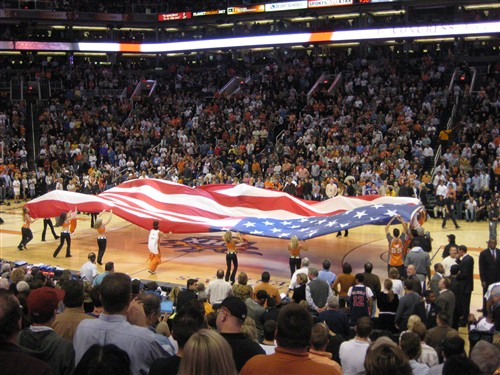
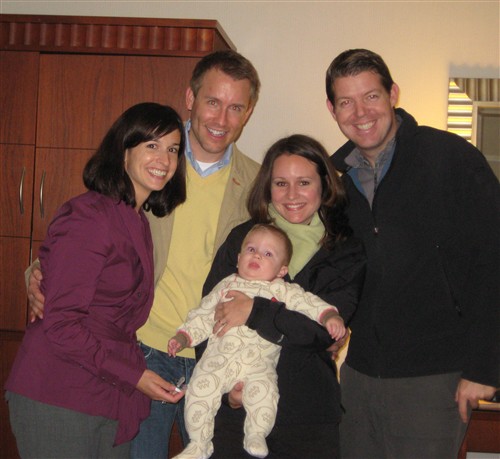
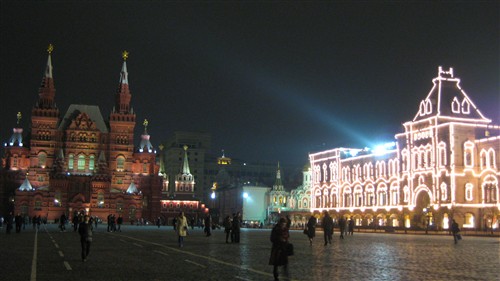
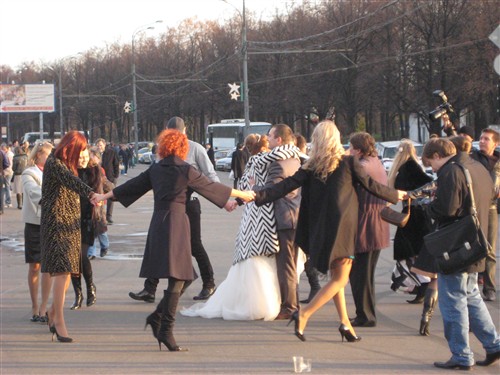 From the first day of our arrival in Saint Petersburg to our last day in Moscow, Russia did not disappoint. Russia has a dizzying number of things to see: beautiful baroque skylines, unique onion-domed cathedrals, fascinating museums, and sober Soviet-era buildings across from modern high-end shopping malls. All corners of Moscow and Saint Petersburg are under constant surveillance by an intimidating number of military and policemen and all corners are connected by one of the most efficient (if not foreign-user-friendly) and utilized public transport systems in the world, which is also heavily policed.
From the first day of our arrival in Saint Petersburg to our last day in Moscow, Russia did not disappoint. Russia has a dizzying number of things to see: beautiful baroque skylines, unique onion-domed cathedrals, fascinating museums, and sober Soviet-era buildings across from modern high-end shopping malls. All corners of Moscow and Saint Petersburg are under constant surveillance by an intimidating number of military and policemen and all corners are connected by one of the most efficient (if not foreign-user-friendly) and utilized public transport systems in the world, which is also heavily policed.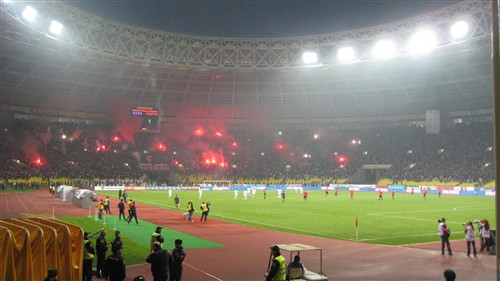
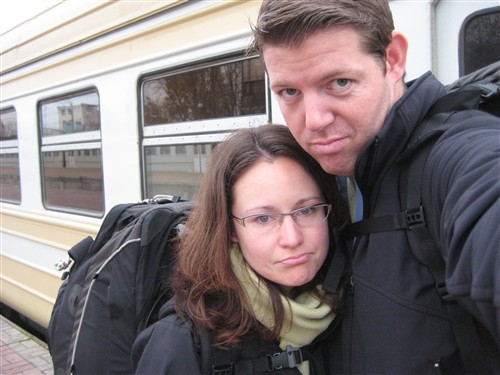 As this epic fourteen-month journey comes to an end, we are both happy and sad. The most amazing, intense, life-changing chapter in our lives is coming to a close. We have come to feel at home on the road and enjoy the simplicity of living out of our backpacks. We find ourselves addicted to the crazy adventures and, even more so, addicted to learning. We have loved spending all of this time together. It has drawn us closer and bonded us tighter than we ever could have imagined. But all good things must come to an end and, as we think about seeing our family, friends and our sweet little dog, we find ourselves as exhilarated as we were on the first day of this adventure. While we are sad to close such a brilliant chapter in our lives, we are excited to start down a new path and wildly curious to see where it takes us. To conclude with the last three lines from my favorite Robert Frost poem:
As this epic fourteen-month journey comes to an end, we are both happy and sad. The most amazing, intense, life-changing chapter in our lives is coming to a close. We have come to feel at home on the road and enjoy the simplicity of living out of our backpacks. We find ourselves addicted to the crazy adventures and, even more so, addicted to learning. We have loved spending all of this time together. It has drawn us closer and bonded us tighter than we ever could have imagined. But all good things must come to an end and, as we think about seeing our family, friends and our sweet little dog, we find ourselves as exhilarated as we were on the first day of this adventure. While we are sad to close such a brilliant chapter in our lives, we are excited to start down a new path and wildly curious to see where it takes us. To conclude with the last three lines from my favorite Robert Frost poem: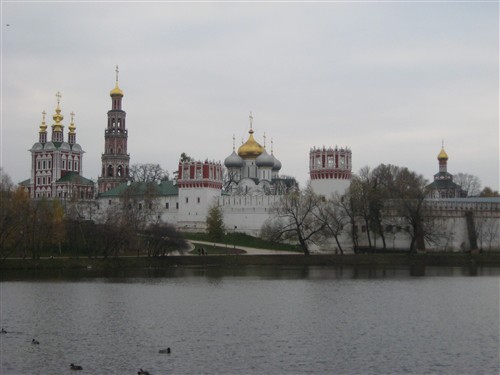
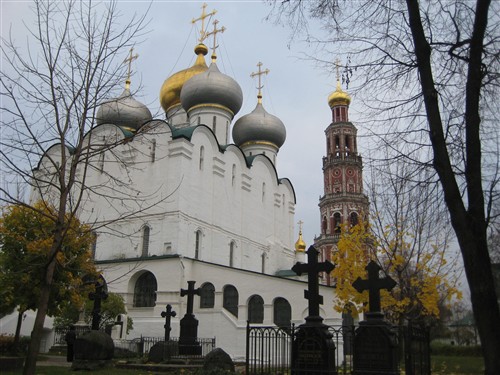 Novodevichy Monastery is located southeast of the city center on the Moscow River. Founded in 1524 to celebrate the retaking of Smolensk from Lithuania, it later served as a strategic watch guard, alerting the city of potential invaders. Today the beautiful white-walled complex with red-and-white baroque turrets, shines brightly against the backdrop of a small suburban lake and park. The obligatory gilded onion domes crown the bell tower and cathedrals housed within the fortress. Before we entered the monastery, we admired the view from afar with a lazy walk around the adjacent lake. With the trees holding on to their last golden leaves and the monastery reflecting on the windswept lake, I was, of course, in photography heaven.
Novodevichy Monastery is located southeast of the city center on the Moscow River. Founded in 1524 to celebrate the retaking of Smolensk from Lithuania, it later served as a strategic watch guard, alerting the city of potential invaders. Today the beautiful white-walled complex with red-and-white baroque turrets, shines brightly against the backdrop of a small suburban lake and park. The obligatory gilded onion domes crown the bell tower and cathedrals housed within the fortress. Before we entered the monastery, we admired the view from afar with a lazy walk around the adjacent lake. With the trees holding on to their last golden leaves and the monastery reflecting on the windswept lake, I was, of course, in photography heaven.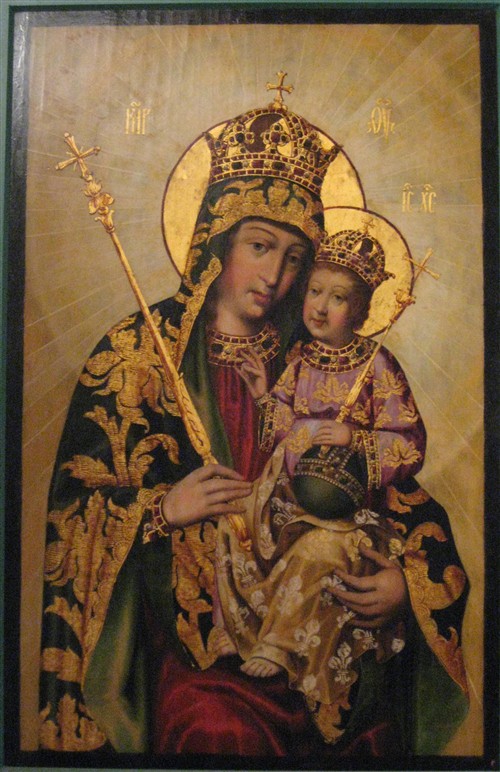 The compound is still an operating monastery but the highlights for us were the two special exhibits which displayed the monastery’s impressive collection of Orthodox iconography, art and religious artifacts. There were other notable sights including the Smolensk Cathedral, an imposing bell tower, and the adjacent Novodevichy Cemetery – final resting place for several famous (and infamous) Russians.
The compound is still an operating monastery but the highlights for us were the two special exhibits which displayed the monastery’s impressive collection of Orthodox iconography, art and religious artifacts. There were other notable sights including the Smolensk Cathedral, an imposing bell tower, and the adjacent Novodevichy Cemetery – final resting place for several famous (and infamous) Russians.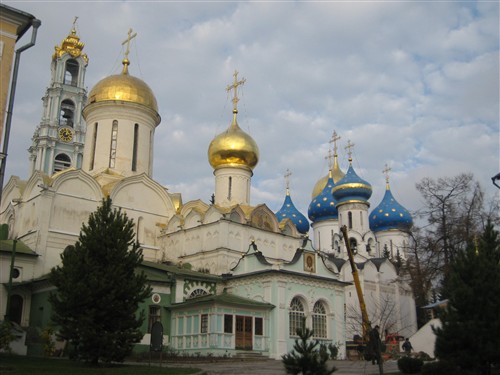

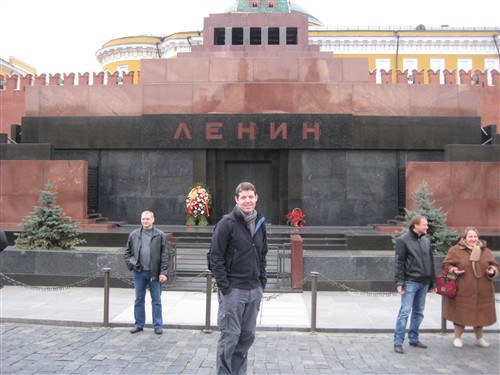 Inside the mausoleum, we climbed a short, dark stairway into a dark room. In the center, Lenin’s illuminated corpse glowed like the moon inside a glass case. He wore a dark suit and his legs were covered in red velvet cloth. One hand was clenched in a fist but the other lay flat and I recall that his fingernails looked to be covered in yellowish fungus. We stared, dumbstruck, unable to look away. We were paralyzed with morbid fascination. One of the guards inside urged us forward and we started moving, albeit slowly, around the perimeter. It was a powerful experience. Lenin, who murdered over a million of his own people, abused and starved countless others to push through a social and political agenda that simply doesn’t work, is revered. After Lenin’s death, Stalin had Lenin’s brain removed so that he could study the “perfect Communist brain”.
Inside the mausoleum, we climbed a short, dark stairway into a dark room. In the center, Lenin’s illuminated corpse glowed like the moon inside a glass case. He wore a dark suit and his legs were covered in red velvet cloth. One hand was clenched in a fist but the other lay flat and I recall that his fingernails looked to be covered in yellowish fungus. We stared, dumbstruck, unable to look away. We were paralyzed with morbid fascination. One of the guards inside urged us forward and we started moving, albeit slowly, around the perimeter. It was a powerful experience. Lenin, who murdered over a million of his own people, abused and starved countless others to push through a social and political agenda that simply doesn’t work, is revered. After Lenin’s death, Stalin had Lenin’s brain removed so that he could study the “perfect Communist brain”.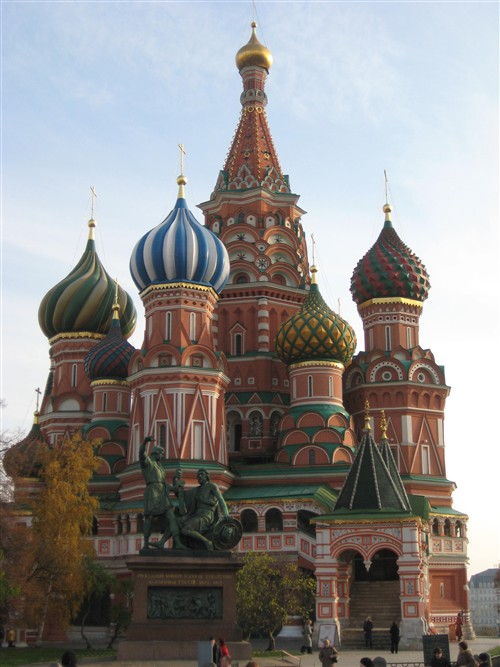 Our final stop in Red Square was Saint Basil’s Cathedral. We had photographed its brilliant polychromatic domes from every angle but we had not yet been inside.
Our final stop in Red Square was Saint Basil’s Cathedral. We had photographed its brilliant polychromatic domes from every angle but we had not yet been inside.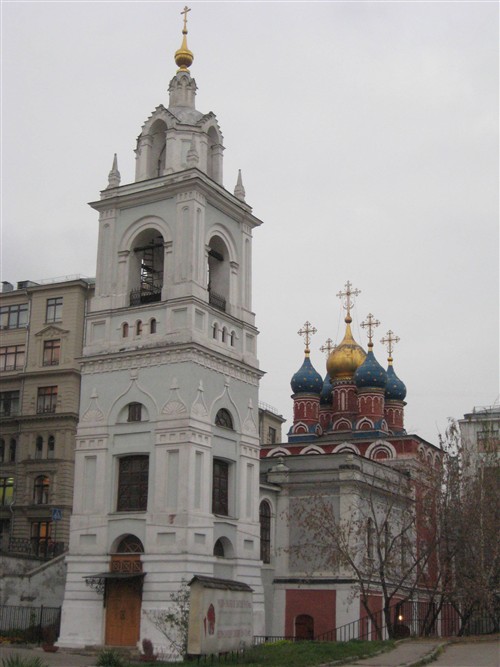 We still had a long walk ahead of us and a list of interesting places to see so we quickly recovered and set out for the medieval neighborhood of Kitay Gorod. Located just southwest of Red Square, the 13th century neighborhood was the first to be established outside the protection of the Kremlin walls. We walked the streets toward a cluster of smaller but still impressive versions of Russia’s unique onion-domed churches. Not long into our foray, we began to notice a large number of luxury cars parked along the street and several black-clad muscle men lurking about in small groups, eyeing us suspiciously as we walked by. Our instincts told us that we had stumbled upon the Russian mafia and we felt an air of uneasiness but decided that our best course of action was to play the role of ignorant tourists – we were conveniently dressed for the part – snapping excessive photos of the churches without a backward glance. The moment passed without incident, of course, but we won’t soon forget that creepy feeling of brushing up against the mob.
We still had a long walk ahead of us and a list of interesting places to see so we quickly recovered and set out for the medieval neighborhood of Kitay Gorod. Located just southwest of Red Square, the 13th century neighborhood was the first to be established outside the protection of the Kremlin walls. We walked the streets toward a cluster of smaller but still impressive versions of Russia’s unique onion-domed churches. Not long into our foray, we began to notice a large number of luxury cars parked along the street and several black-clad muscle men lurking about in small groups, eyeing us suspiciously as we walked by. Our instincts told us that we had stumbled upon the Russian mafia and we felt an air of uneasiness but decided that our best course of action was to play the role of ignorant tourists – we were conveniently dressed for the part – snapping excessive photos of the churches without a backward glance. The moment passed without incident, of course, but we won’t soon forget that creepy feeling of brushing up against the mob.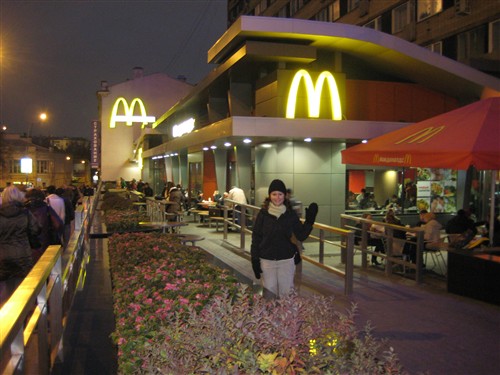 Taking the scenic route “home”, we passed by the Lubyanka Building, the former headquarters of the infamous KGB, which now houses its successor, the Federal Security Bureau; the Museum of Modern Art; and, most importantly, the world’s largest and busiest McDonald’s. With the capacity to accommodate up to 700 Hamburglars, the place was a zoo. After standing in a massive queue, we proceeded to suffer through the most excruciating ordering experience in our broad portfolio of international McDonald’s encounters. Out of 36 countries, Russia has posed the biggest language barrier. We did finally manage to communicate our order and get what we wanted but we left feeling defeated nonetheless.
Taking the scenic route “home”, we passed by the Lubyanka Building, the former headquarters of the infamous KGB, which now houses its successor, the Federal Security Bureau; the Museum of Modern Art; and, most importantly, the world’s largest and busiest McDonald’s. With the capacity to accommodate up to 700 Hamburglars, the place was a zoo. After standing in a massive queue, we proceeded to suffer through the most excruciating ordering experience in our broad portfolio of international McDonald’s encounters. Out of 36 countries, Russia has posed the biggest language barrier. We did finally manage to communicate our order and get what we wanted but we left feeling defeated nonetheless.